
Ecuador, officially the Republic of Ecuador, is a country in northwestern South America, bordered by Colombia on the north, Peru on the east and south, and the Pacific Ocean on the west. Ecuador also includes the Galápagos Islands in the Pacific, about 1,000 kilometers (621 mi) west of the mainland. The country's capital is Quito, but its largest city is Guayaquil.
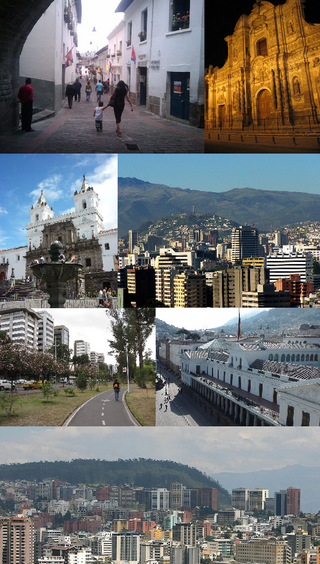
Quito, officially San Francisco de Quito, is the capital of Ecuador, with an estimated population of 2.8 million in its metropolitan area. It is also the capital of the province of Pichincha. Quito is located in a valley on the eastern slopes of Pichincha, an active stratovolcano in the Andes.
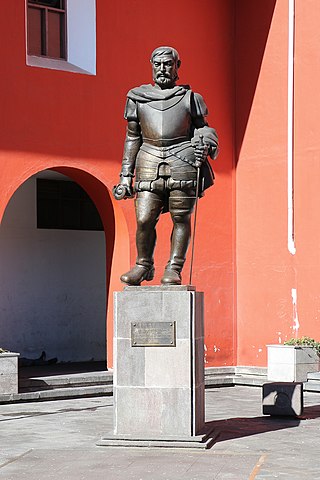
Sebastián Moyano y Cabrera, best known as Sebastián de Belalcázar was a Spanish conquistador. Belalcázar, also written as Benalcázar, is known as the founder of important early colonial cities in the northwestern part of South America; Quito in 1534 and Cali, Pasto and Popayán in 1537. Belalcázar led expeditions in present-day Ecuador and Colombia and died of natural causes after being sentenced to death in Cartagena de Indias, Colombia in 1551.

Riobamba is the capital of Chimborazo Province in central Ecuador, and is located in the Chambo River Valley of the Andes. It is located 200 km (120 mi) south of Ecuador's capital Quito and situated at an elevation of 2,754 m.

Quito, officially the Metropolitan District of Quito, is a canton in the province of Pichincha, Ecuador.
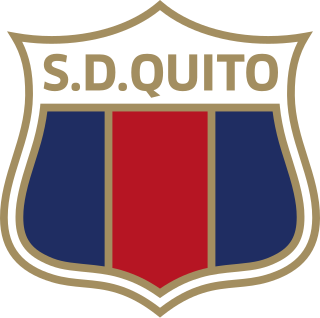
Sociedad Deportivo Quito is an Ecuadorian club football club based in Quito. For most of its existence, it competed in Serie A, the highest level of the Ecuadorian professional football league. And currently competes in the Second Category of Pichincha.

Liga Deportiva Universitaria, often referred to as LDU Quito, is an Ecuadorian professional football club based in Quito. They play in the Serie A, the highest level of the Ecuadorian professional football league. They play their home games at the Estadio Rodrigo Paz Delgado, more commonly referred to as Casa Blanca. Rival clubs include Quito-based clubs El Nacional, Deportivo Quito, Aucas and Universidad Católica.

The Liga Pro Bet593, simply known as the Liga Pro, or the Serie A, is a professional football league in Ecuador. At the top of the Ecuadorian football league system, it is the country's premier football competition. Contested by sixteen clubs, it operates a system of promotion and relegation with the Serie B, the lower level of the Primera Categoría. The season runs from February to December and is usually contested in multiple stages.

The Battle of Pichincha took place on 24 May 1822, on the slopes of the Pichincha volcano, 3,500 meters above sea-level, right next to the city of Quito, in modern Ecuador.
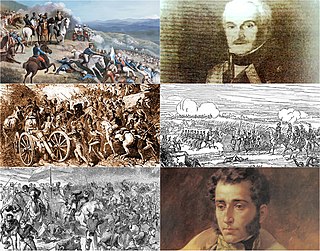
The Ecuadorian War of Independence, part of the Spanish American wars of independence of the early 19th century, was fought from 1809 to 1822 between Spain and several South American armies over control of the Real Audiencia of Quito, a Spanish colonial jurisdiction which later became the modern Republic of Ecuador. The war ended with the defeat of the Spanish forces at the Battle of Pichincha on May 24, 1822, which brought about the independence of all the lands of the Real Audiencia of Quito.

Santo Domingo de los Colorados, often simply referred to as Santo Domingo, is an Ecuadorian city and seat of the canton that bears its name and the Santo Domingo de los Tsáchilas Province. It is the fourth most populous city in Ecuador, with a population of 334,826, and is an important commercial and industrial center.

The Real Audiencia of Quito was an administrative unit in the Spanish Empire which had political, military, and religious jurisdiction over territories that today include Ecuador, parts of northern Peru, parts of southern Colombia and parts of northern Brazil. It was created by Royal Decree on 29 August 1563 by Philip II of Spain in the city of Guadalajara. It ended in 1822 with the incorporation of the area into the Republic of Gran Colombia.

Luis Telmo Paz y Miño Estrella, more commonly known as Telmo Paz y Miño, was President of the Supreme Military Junta of Ecuador in July 1925.
The 1969 Campeonato Ecuatoriano de Fútbol was the 11th national championship for football teams in Ecuador. LDU Quito won their first national title.

The Quito School is a Latin American colonial artistic tradition that constitutes essentially the whole of the professional artistic output developed in the territory of the Royal Audience of Quito – from Pasto and Popayán in the north to Piura and Cajamarca in the south – during the Spanish colonial period (1542–1824). It is especially associated with the 17th and 18th centuries and was almost exclusively focused on the religious art of the Catholic Church in the country. Characterized by a mastery of the realistic and by the degree to which indigenous beliefs and artistic traditions are evident, these productions were among of the most important activities in the economy of the Royal Audience of Quito. Such was the prestige of the movement even in Europe that it was said that King Carlos III of Spain (1716–1788), referring to one of its sculptors in particular, opined: "I am not concerned that Italy has Michelangelo; in my colonies of America I have the master Caspicara".
The 1974 Campeonato Ecuatoriano de Fútbol de la Serie A was the 16th national championship for football teams in Ecuador. LDU Quito won their second national title.

Mariscal Sucre International Airport is an international airport serving Quito, Ecuador. It is the busiest airport in Ecuador. It is located in the Tababela parish, about 18 kilometres (11 mi) east of Quito, and because of its location it is also colloquially known as Tababela Airport. The airport currently serves as the main hub for Avianca Ecuador and the largest hub for LATAM Ecuador. It also served as the main hub for TAME, Ecuador's flag-carrier, before the airline was liquidated by the Ecuadorian government in 2020. The airport opened in February 2013 and replaced the 53-year old airport of the same name. The airport is named after independence leader Antonio José de Sucre. It was the first 5-star airport in the Western Hemisphere as rated by Skytrax.
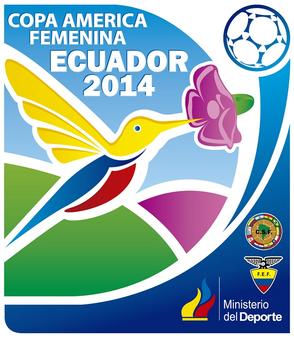
The 2014 Copa América Femenina was the seventh edition of the Copa América Femenina, an association football competition for women's national teams in South America affiliated with CONMEBOL. The tournament was played between 11 and 28 September 2014 in Ecuador.
The following is a timeline of the history of the city of Quito, Ecuador.
Liga Deportiva Universitaria de Quito's 2022 season was the club's 92nd year of existence, the 69th year in professional football, and the 61st in the top level of professional football in Ecuador.
















